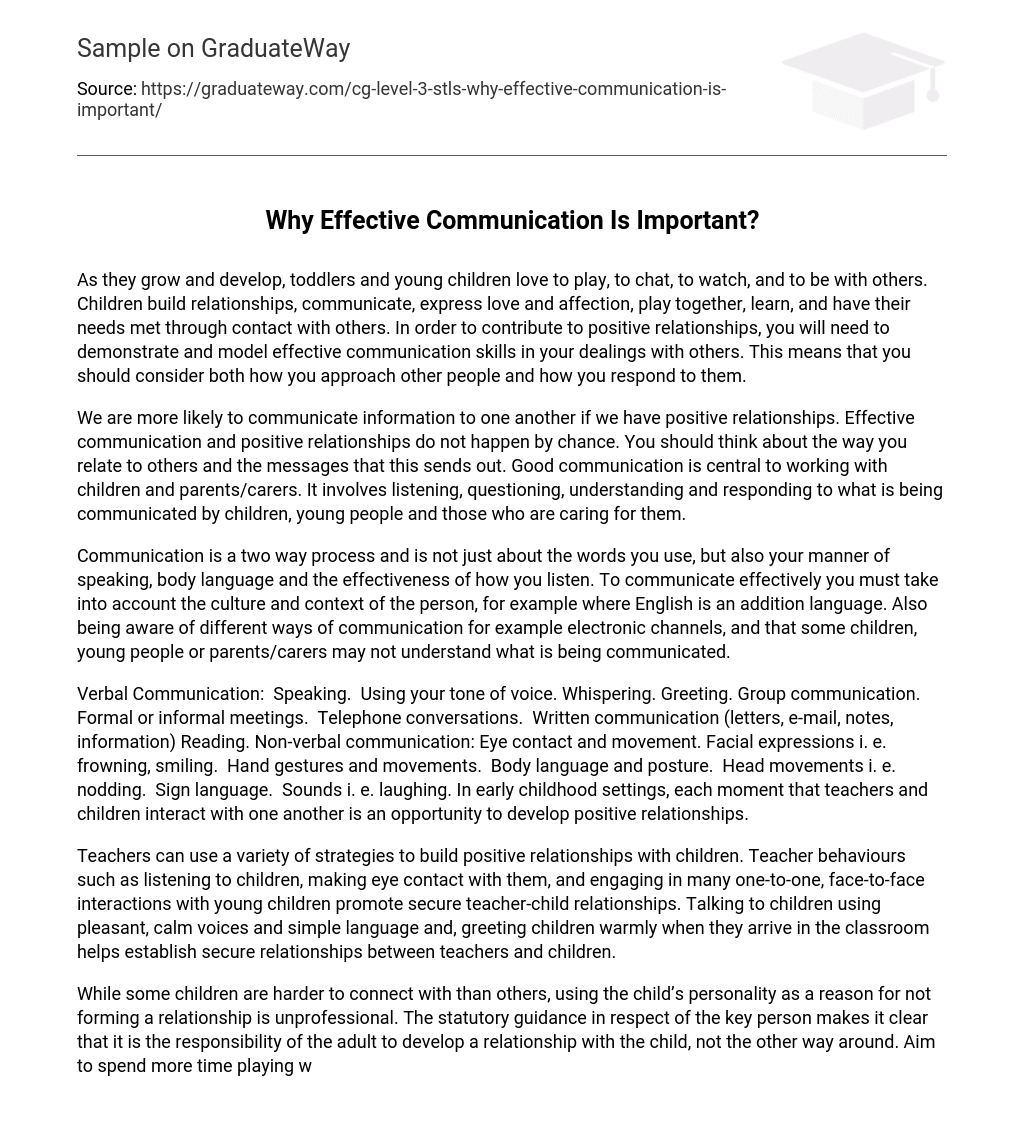Toddlers and young children participate in a range of activities, including playing, chatting, watching, and being with others, to promote their growth and development. These social interactions enable them to establish connections, communicate efficiently, show love and affection, play together, acquire new knowledge, and have their needs fulfilled. To cultivate positive relationships, it is essential to exhibit effective communication skills by taking into account both your attitude towards others and your reactions.
The development of positive relationships is essential for effective communication. This entails consciously making an effort to build and enhance these relationships, as well as improve our communication abilities. It is crucial to analyze our interactions with others and be conscious of the messages we convey through both actions and words. Effective communication holds particular significance in situations involving children, parents, and caregivers. This encompasses actively listening, asking pertinent questions, comprehending the messages conveyed by children and young individuals, and delivering appropriate responses.
Effective communication encompasses more than simply the words utilized. It also incorporates one’s tone, body language, and listening abilities. Taking into account an individual’s culture and context is crucial, especially when English is not their primary language. Furthermore, we should be aware of diverse communication methods like electronic channels. We must bear in mind that not everyone may comprehend the message being conveyed, particularly children, young individuals, or parents/carers.
Verbal Communication involves speaking and using tone of voice, whether it is whispering, greeting, or engaging in group communication. This can happen in formal and informal settings like meetings or phone conversations. Written communication, which includes letters, emails, notes, and sharing information is also significant. Reading serves as another form of verbal communication.
Non-verbal communication encompasses various expressions such as maintaining eye contact and using facial expressions like frowning or smiling. Hand gestures, body language and posture, head movements like nodding, sign language, and even sounds like laughter are all ways people communicate without words.
In early childhood settings, every interaction between teachers and children provides an opportunity to cultivate positive relationships.
Teachers have various methods to establish positive connections with children. Actions such as actively listening and maintaining eye contact contribute to forming secure teacher-child relationships. Creating frequent one-on-one interactions also helps nurture these secure bonds. Moreover, using pleasant and calm tones when speaking to children and warmly greeting them upon entering the classroom are effective approaches for teachers to build secure relationships with their students.
While it may be difficult to connect with some children, it is not professional to use their personality as a reason for not building a relationship. According to the statutory guidance on key person roles, it is the responsibility of adults to create a bond with the child instead of relying on the child to do so. It is important to dedicate more time towards playing and engaging with the child’s interests, as well as showing more happiness through smiles. Sometimes, struggles in communication or forming relationships may indicate an underlying problem that needs to be identified.
When developing positive teacher-child relationships, it is crucial to remember these factors:
- Engage in one-to-one interactions with children
- Get on the child’s level for face-to-face interactions
- Use a pleasant, calm voice and simple language
- Provide warm, responsive physical contact
- Follow the child’s lead and interest during play
- Help children understand classroom expectations
- Redirect children when they engage in challenging behaviour
- Listen to children and encourage them to listen to others
- Acknowledge children for their accomplishments and effort.
Building strong and positive relationships is vital for effective communication and support for children and their families. Weak relationships can lead to sharing inaccurate information or withholding information due to a lack of trust. It is important to develop positive relationships with parents in order to promote close collaboration that benefits the child, including facilitating a smooth transition, exchanging developmental information, and understanding the child’s interests.





